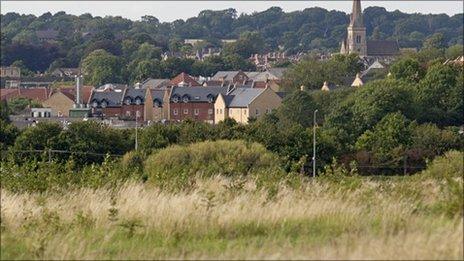Row deepens over English planning law changes
- Published

Conservationists say the threat to the countryside will grow as the economy recovers
The planning minister has rounded on campaigners who claim his proposed planning system overhaul for England seriously threatens the countryside.
Greg Clark accused the National Trust of "misleading" people, and suggested the Campaign to Protect Rural England always "objected to every change".
The groups fear excessive development under a simpler, faster system.
A National Trust spokesman said the plans "failed to protect the everyday places that local communities love".
The government's Draft National Planning Policy Framework, external streamlines policy that currently weighs in at more than 1,000 pages down to just 52.
It aims to transform a system whose "volume and complexity have made planning increasingly inaccessible to all but specialists", says the Department for Communities and Local Government.
While encouraging opportunities for growth to boost the economy, the department insists the proposals also offer protection for the natural and historic environment.
But the framework's "presumption in favour of sustainable development" - which should make it harder for councils to reject projects - worries the conservationists.
Speaking out last month, the National Trust said: "The government's planning reforms could lead to unchecked and damaging development in the undesignated countryside on a scale not seen since the 1930s."
And CPRE said: "The government needs to listen and make further improvements or the consequences for the English countryside and the character of our towns and villages will be grave."
Housing 'misery'
In an interview with the Financial Times on Tuesday, Mr Clark hit back.
"The National Trust had on their website an aerial shot of Los Angeles in some risible idea that this was the future of Britain," he said.
"If you can square a village voting for 10 new homes for its parishioners with the sprawl of Beverly Hills or Santa Monica, I fail to see it."
He added: "Last year was the lowest level of housebuilding since World War II, which means the problem is getting worse and worse, causing more misery for more people for as long as this isn't addressed.
"People do have an interest in the future - to not care shows a degree of nihilistic selfishness which is quite rare."
He also said that it was not possible to make a change to "any element of national planning policy without the CPRE objecting to it".
In response to the interview, a National Trust spokesman said: "We believe strongly that any development must meet the needs of people, the environment as well as the economy.
"The government has failed to do this in its reforms. It has put short-term financial gain ahead of everything else. It has failed to protect the everyday places that local communities love."
He added: "The dice are heavily loaded to favour development and local people simply won't get enough say."
'Betrayed'
Neil Sinden, CPRE director of policy, said there ought to be no surprise within government at the "huge public outcry" over the plans.
"We welcomed initial indications that the government wanted a stronger role for local communities, including a limited public right of appeal against damaging development.
"Both coalition partners appeared committed to such reforms before the election but many people now feel betrayed," Mr Sinden said.
The Home Builders Federation, which represents the house-building industry, accused the National Trust of "scaremongering" and said the debate over planning policy "must focus on the wider needs of the country, not the narrow focus of a few".
"We have an acute housing crisis that has resulted in millions living in sub-standard accommodation or on waiting lists and young people unable to buy their own home," said executive chairman Stewart Baseley.
"To address this we need a planning system that balances social, economic and environmental concerns."
- Published9 August 2011
- Published26 July 2011
- Published26 May 2011